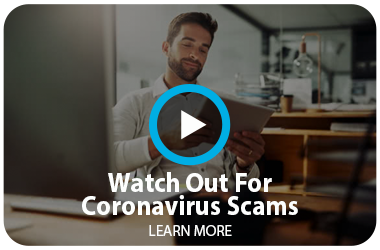Watch Out For Coronavirus Scams
Updated 12/7/2020
With people nervous about the COVID-19 coronavirus, scammers already are swooping in to take advantage of those fears.
While it’s normal to want to learn more about the coronavirus and information surrounding it, experts are warning people to be cautious of scammers who are trying to infect your devices with malware, get personal information from you, or who are trying to get you to send them money for worthless or non-existent products. There have even been reports of crooks threatening people over late or missed payments.
According to the Federal Trade Commission and other experts, here are some of the scams to watch out for:
Email phishing has already begun. Scammers are sending out emails claiming to be from the Centers for Disease Control or other health agencies, claiming to contain updates about the coronavirus. Consumers are being warned to be wary of these emails and not to click on any links or download any attachments unless they are absolutely sure of the source. Clicking on links or downloading attachments could install malware on your computer or take you to counterfeit sites where you might be asked to provide vital personal information.
Some scammers claim to be selling products that can prevent the disease, treat it or maybe even make it go away. Don’t believe the claims. The FTC says there are currently no “pills, potions, lotions, lozenges or other prescription or over-the-counter products available to … cure Coronavirus … online or in stores.” Don’t fall for these claims and don’t send any money. You’ll either be mailed a worthless product or receive nothing at all.
As access to vaccines and testing kits become more widely available, make sure they have been approved by the FDA and that they are being provided by official sources.
As more people suffer financial hardship due to reduced hours or loss of jobs, scammers are likely to be contacting them threatening to disconnect vital services such as utilities or communications unless you pay them immediately. Legitimate businesses won’t threaten you, won’t demand payment in cash, gift cards or wire transfers, and they won’t ask for financial account numbers, your Social Security number, or account passwords.
Some people are even posing as charities, hoping to rely on the kindness of others to steal your money.
To guard against these scams, experts say to:
- Delete unsolicited email and to not click on links in them or download files.
- Don’t fall for online claims of remedies or vaccinations.
- Don’t react to threats by making payments with gift cards or wires.
- If you have any concern that an email or call could be legitimate, type in a company’s official website address by hand or call an official number listed on a bill, statement or payment card. Tell them why you are contacting them.
- Get information only from trusted sites, such as the Centers for Disease Control, the World Health Organization or from trusted news sources.
While it’s natural to want to learn more about the coronavirus pandemic and to do what you can to protect yourself and others, it’s important to be cautious in order to protect yourself from scammers.
Ready for What’s Next?
Have questions? Ready to start building a relationship with one of our experienced bankers?






